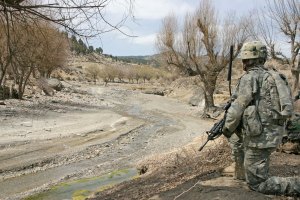Time was that America cared a lot about its veterans. A whole lot. But lately it hasn’t showed as much appreciation as you might think. That is, not for about 60 years.
Iraq and Afghanistan is no World War 2. No welcoming crowds. No grateful nation mobilized in homecoming as much as for the sendoff. None of that for our people. Just a few well-wishers at airports such as Bangor ME (where amazing volunteers meet every single returning flight). Welcomes are sporadic and often unnoticed.
But then again, as Veterans Day rolls around, we can ask, when was truly the last time we met our obligations to those returning? After interviewing and speaking with veterans for years this is what I heard:
Korean War: Service-members might be gone for a year or two, counting time for train-up and their draft obligation. Many of them faced human-wave attacks as hordes of red Chinese advanced up frozen hillsides on dark evenings against isolated outposts. Those taken prisoner could be shot in the snow if they fell out of line. Veterans, upon their return, were often asked, “Where have you been? We thought you got a new job out of town.” No one even knew they had gone to fight.
Vietnam War: Widespread maltreatments of returning service-members. Treatment so bad that they were often advised to change out of their uniforms before leaving the airport terminal to escape abuse. Many of them faced months of patrolling in densely covered mountains and deep paddies looking for an elusive enemy who often killed from afar, or with bobby traps close up. The death toll among helicopter aircrew alone numbered over 4,000.
Gulf War I: A quick war with a rousing return and quick return to obscurity. Lingering effects from Gulf War Syndrome persisted for years with little understanding of what was affecting the health of thousands of service-members.
Iraq and Afghanistan. Constant patrolling for months in armored vehicles that were not designed for the mission. Booby traps widespread on foot patrols. A strategic muddle. Returns routinely ignored by most people. One night in 2006 I interviewed a soldier on patrol in Paktika Province in eastern Afghanistan, about ten kilometers from the border. He lamented that his brother thought the Afghan war was over and that he was serving in Iraq – both assumptions horribly wrong.
These men and women returned to complete disarray at Walter Reed Hospital, more disarray across the Veterans Administration and a suicide rate that has remained stubbornly high for years, alongside an unemployment running higher than the national average. The bright spot is a GI Bill that works.
The tendency on Veterans Day is for us to congratulate ourselves and bask in the accomplishments of our veterans. We thank veterans and notice what a wonderful job they did.
Swept under the rug is the reality of the actual experience of veterans. Their reception has too often been inadequate or even shameful.
There might be a solution to all this but I don’t know what it is. Is it too late to apologize to the Vietnam and Korean War veterans whose lives were lost in the tens of thousands for too little recognition? Is it too late to apologize to the veterans of Iraq and Afghanistan who heard time and again from their own elected officials that they “opposed the war but supported the troops.” (By the way, in my ten years in the war zone I never met anyone over there who thought that notion was anything other than a cop-out of the lowest order).
No, it’s not too late. If you see a veteran ask him where and when he served. Vietnam, Korea, Lebanon, Grenada, Panama, Kuwait, Iraq or Afghanistan, it doesn’t matter. Ask and he or she will tell you. Then say thank you like you really mean it, and as we should have said all along.
